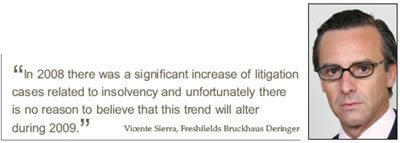Domestic lessons helping to drive international success – Herbert Smith
International expansion is a question of risk control, but the experiences energy companies have gained overcoming domestic challenges is helping them succeed abroad
A wide number of factors are driving energy business to look beyond Iberia for new opportunities, but the depressed domestic economic situation and uncertainty over forthcoming feed-in tariff changes in the renewably sectors are having an inevitable impact, says Miguel Riaño, partner with Herbert Smith in Madrid.
The depth of expertise that many energy companies have gained at home is now what is assisting many of them to grow and to succeed abroad.
“The experience gained and the development in recent years, first in the wind energy sector and subsequently within solar energy, is precisely what is allowing many companies to expand to new markets.
But coupled with this, opportunities have emerged in a number of countries that have approved very favorably economic frameworks to develop renewable energies,” he says. Among the markets in which there is growing interest, reflecting the heaviest investment and potential rewards, he suggests as the US – initially regarding wind energy, but also now solar power, notably with the encouragement of the US Stimulus Plan and subsequent incentives – Italy, the Middle East and, in general, North Africa for solar power projects.
“Energy companies and constructors are looking for markets that are going to provide more stable, less uncertain, returns and that is why we are seeing companies looking to some of these markets where wind or solar energy is now a strategic policy focus.”
But despite the evident international attractions, issues and challenges do recur, says fellow partner Ignacio Paz.
“The main barrier clients face is correctly understanding the applicable regulations in each country and the degree of legal certainty and protection it provides to long-term investments.”
In such circumstances, lawyers’ roles often therefore consist of helping clients to make international investments on terms that are similar to that which they are accustomed to in Spain.
“We liaise with the client to receive instructions, and coordinate with local counsel, ensuring that any internal corporate policies and standards the client would normally seek in similar transactions are met wherever the projects happen to be,” says Paz.
Often the legal team must help provide the investment with greater legal protection, as well as be alive to the added need for immediacy and responsiveness, adds Eduardo Soler Tappa.
A former State Advocate, he previously worked within the Energy and Industry Departments of the Spanish Ministry for Industry, Tourism and Trade.
State Advocate who was working at the Spanish Industrial Ministry “The aim is to be permanently accessible, to hold regular meetings with the client and to monitor the status of the project – often the preference being for meetings to be held in Spain to avoid any unnecessary travel.”
Riaño is now the partner in the Madrid office in charge of inbound and outbound investment in Asia. Paz has the same role in relation to Latin America, particular Brazil, where opportunities in the energy and infrastructure sector are truly significant, they note.
It is now not merely therefore the leading energy companies looking for international opportunities. Mid-size players, technology manufacturers, service providers and sector-focused investment funds are all looking to capitalise on new international opportunities.
“In some respects we have to help companies change the ‘chip’ or ‘programming’ within them, to help them look and operate more internationally. Others are already much more open to new markets. But in either case, we have to help them manage their risks, both the ones they already know and new ones over the horizon. International growth is fundamentally a question of risk control,” says Riaño.












